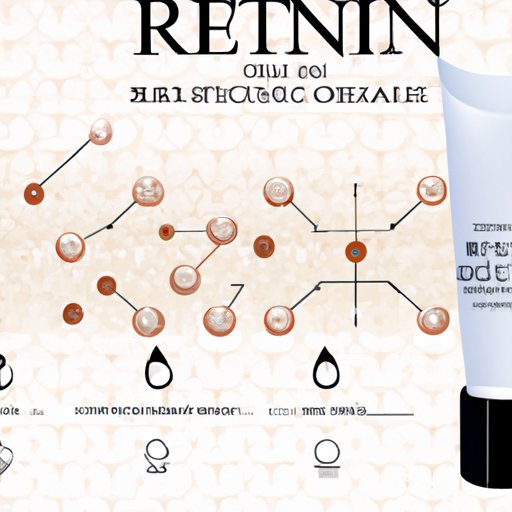Introduction
Retinol is a derivative of Vitamin A that has been used for decades as an effective anti-aging ingredient. It is widely available over the counter and can be found in many skincare products such as creams, serums, and lotions. Retinol has a wide range of beneficial effects on the skin, from improving skin tone and texture to reducing wrinkles and age spots. In this article, we will explore the science behind retinol and how it improves skin health.
The Science Behind Retinol and How It Improves Skin
Retinol works by stimulating the production of collagen, elastin, and hyaluronic acid in the skin, which are key components of healthy skin. Collagen helps to maintain skin’s firmness, while elastin helps to keep skin flexible and elastic. Hyaluronic acid helps to keep skin hydrated and plump. By increasing the production of these three components, retinol helps to improve the overall health of the skin.
Retinol also helps to reduce the appearance of wrinkles and age spots by increasing cell turnover. This process helps to slough off dead skin cells, allowing newer, healthier cells to take their place. As a result, skin appears smoother and more youthful.
In addition, retinol helps to reduce inflammation and acne. It does this by boosting cell turnover and unclogging pores, which helps to prevent breakouts. It also reduces oil production, which can help to reduce the severity of acne.

Understanding the Different Forms of Retinol and Their Effects on Skin
Retinol is available in a variety of forms, including gels, creams, serums, and lotions. Each form of retinol has its own set of pros and cons, so it’s important to understand the differences between them before deciding which one is right for you.
Gels are usually the strongest form of retinol, as they deliver a concentrated dose of the ingredient directly to the skin. However, they can be irritating to some people, so it’s best to start with a lower concentration if you have sensitive skin. Creams and lotions are gentler than gels, but they may not be as effective at treating wrinkles and age spots.
Serums are usually the most effective form of retinol, as they are formulated to penetrate deep into the skin. They also tend to be less irritating than other forms of retinol, making them ideal for those with sensitive skin. However, they can be expensive and may require multiple applications for maximum effectiveness.

How to Use Retinol for Maximum Skin Benefits
When using retinol, it’s important to follow the instructions on the product label. Generally, you should apply a thin layer of retinol to the areas of your face that need treatment, such as wrinkles or age spots. You should use a gentle, circular motion when applying the product, and make sure to avoid getting it in your eyes or mouth.
It’s also important to use retinol regularly in order to get the maximum benefit. Most products recommend using them once or twice per week, but you may need to adjust the frequency depending on your individual needs. Additionally, it’s a good idea to apply a moisturizer after using retinol, as it can be drying on the skin.

A Look at the Benefits of Retinol Creams and Serums
Retinol creams and serums are popular skincare products because they are highly effective at improving skin health. They are formulated with a combination of retinol and other beneficial ingredients, such as antioxidants, peptides, and hydrators, which help to nourish and protect the skin. Additionally, retinol creams and serums often contain additional anti-aging ingredients, such as peptides and hyaluronic acid, which can further enhance their effectiveness.
Retinol’s Role in Anti-Aging Treatments
Retinol plays an important role in anti-aging treatments, as it helps to reduce wrinkles and fine lines, improve skin tone and texture, and even out skin discoloration. It can also be used as part of a wider anti-aging regimen, such as a facial or laser treatment, for even better results. Additionally, retinol can be used to treat acne, as its anti-inflammatory properties can help to reduce breakouts and minimize scarring.
Conclusion
Retinol is a powerful anti-aging ingredient that can improve skin health in a variety of ways. It helps to stimulate collagen production, increase cell turnover, and reduce inflammation and acne. It comes in a variety of forms, including gels, creams, and serums, and can be used in combination with other anti-aging treatments for maximum benefit. With proper use, retinol can help to reduce wrinkles, improve skin tone and texture, and give your skin a more youthful and radiant appearance.
Overall, retinol is a safe and effective way to improve skin health. Whether you’re looking to reduce wrinkles, even out skin discoloration, or treat acne, retinol can be a great addition to your skincare routine.


